- Home
- Sherry Thomas
Claiming the Duchess Page 3
Claiming the Duchess Read online
Page 3
I am drunk without having touched a drop of spirits.
Will you make me permanently intoxicated with life and all its beauty by consenting to become my wife? I am already the happiest man alive. But as your husband, I would also be the proudest.
Yours devotedly,
J.M.K.
She pressed the note against her heart, but only for a moment, as she rushed to open the door and pull him inside. Before he could speak, she placed a finger over his lips and led him to her sitting room, and with him leaning over her shoulder, penned her reply.
My dear Mr. Kingston,
Why, yes, of course I will marry you. I did say that I would choose a gentleman from among those at my house party for my future spouse, did I not? I am a woman of my word.
If it is agreeable to you, let us marry as soon as we can obtain a special license. Where should we go for our honeymoon? We need not return until the Eton and Harrow game in July.
Yours impatiently,
Clarissa
Her dear James solemnly read the note after she handed it to him, even though he already knew exactly what it said. He then kissed it, folded it carefully, and put it into the inside pocket of his jacket.
“When your party disperses, will you come with me to my house and see my hydrangea garden?” he asked.
In other words, would she like to come and see his heart held out before him and the hope that had sustained him all these years?
She rose and wrapped her arms around him. “Yes, I will, darling. There is nothing I’d like to see more—except you, every day of my life.”
***
Thank you for reading Claiming the Duchess.
Want to know when the next Sherry Thomas novel will be released? Sign up for her newsletter at www.sherrythomas.com. You can also follow her on twitter at @sherrythomas and like her Facebook page at http://facebook.com/authorsherrythomas.
A review at Goodreads or at a venue of your choice would be greatly appreciated.
Claiming the Duchess is related to Beguiling the Beauty, which tells Christian’s story. If you would like to skip ahead to an excerpt of Beguiling the Beauty, click here. To see a list of Sherry’s other books, click here.
About the Author
***
Sherry Thomas writes both historical romance and young adult fantasy.
On the romance side, she is one of the most acclaimed authors working in the genre today, her books regularly receiving starred reviews and best-of-the-year honors from trade publications. She is also a two-time winner of Romance Writers of America’s prestigious RITA® Award.
On the young adult side, The Perilous Sea, book 2 of the Elemental Trilogy, releases September 2014.
Sherry writes in her second language. She learned English by reading romance and science fiction—every word Isaac Asimov ever wrote, in fact. She is proud to say that her son is her biggest fanboy—for the YA fantasy, not the romances. At least, not yet…
You can receive email updates on Sherry’s upcoming books, contact her, and find her on the web at http://www.sherrythomas.com/contact.php.
Beguiling the Beauty: an excerpt
Prologue
***
It happened one sunlit day in the summer of 1886.
Until then, Christian de Montfort, the young Duke of Lexington, had led a charmed life.
His passion was the natural world. As a child, he was never happier than when he could watch hatchling birds peck through their delicate eggshells, or spend hours observing the water striders that populated the family trout stream. He kept caterpillars in terrariums to discover the outcomes of their metamorphoses—brilliant butterflies or humble moths, both thrilling him equally. Come summer, when he was taken to the seashore, he immersed himself in the tide pools and understood instinctively that he was witnessing a fierce struggle for survival, without losing his sense of wonder at the beauty and intricacy of life.
After he learned to ride, he disappeared regularly into the countryside surrounding his imposing home. Algernon House, the Lexington seat, occupied a corner of the Peak District. Upon the faces of its chert and limestone escarpments, Christian, a groom in tow, hunted for fossils of gastropods and mollusks.
He did run into opposition from time to time. His father, for one, did not approve of his scientific interests. But Christian was born with an innate assurance that took most men decades to develop, if at all. When the old duke thundered over his inelegant use of time, Christian coolly demanded whether he ought to practice his father’s favorite occupation at the same age: chasing maids around the manor.
As if such nerve and aplomb weren’t enough, he was also tall, well built, and classically handsome. He sailed through life with the power and imperviousness of an ironclad, sure of his bearing, convinced of his destination.
His first glimpse of Venetia Fitzhugh Townsend only further fueled that sense of certainty.
The annual Eton and Harrow cricket match, a highlight of the London Season, had just paused for the players’ afternoon tea. Christian left the Harrow players’ pavilion to speak to his stepmother—his former stepmother, as a matter of fact, as she had recently returned from her honeymoon with her new husband.
Christian’s father, the late duke, had been a disappointment, as self-important as he’d been frivolous. He had, however, been fortunate in his choice of wives. Christian’s mother, who’d died too young for him to remember, was generally praised as saintly. His stepmother, who came into his life not long thereafter, had proved a great friend and a staunch ally.
He’d seen the dowager duchess earlier, in the middle of the match. But now she no longer stood in the same spot. Scanning the far edge of the field, the sight of a young woman momentarily halted his gaze.
She was casually perched on the back of an open phaeton, yawning behind her fan. Her posture was slouchy, as if she’d secretly rid herself of the whalebone undergarments that bludgeoned other ladies to sit as stiff as effigies. But what made her stand out from the crowd was her hat—a coronet of apricot-colored feathers that reminded him of the sea anemones that had fascinated him in childhood.
She snapped closed her fan and he forgot all about sea anemones.
Her face—he lost his breath. He’d never encountered beauty of such magnitude and intensity. It was not allure, but grace, like the sight of land to a shipwrecked man. And he, who hadn’t been on a capsized vessel since he was six—and that had only been an overturned canoe—suddenly felt as if he’d been adrift in the open ocean his entire life.
Someone spoke to him. He couldn’t make out a single word.
There was something elemental to her beauty, like a mile-high thunderhead, a gathering avalanche, or a Bengal tiger prowling the darkness of the jungle. A phenomenon of inherent danger and overwhelming perfection.
He felt a sharp, sweet ache in his chest: His life would never again be complete without her. But he felt no fear, only excitement, wonder, and desire.
“Who is that?” he asked no one in particular.
“That’s Mrs. Townsend,” answered no one in particular.
“She is a bit young to be a widow,” he said.
The arrogance of that statement would amaze him in subsequent years—that he would hear her called a missus and immediately assume her husband to be dead. That he took it for granted nothing could possibly stand in the way of his will.
“She isn’t a widow,” he was informed. “She happens to be very much married.”
He hadn’t noticed anyone accompanying her. She appeared to him as if on a stage, alone and flooded by limelight. But now he saw that she was surrounded by people. Her hand rested casually on a man’s forearm. Her face was turned toward this man. And when he spoke, she smiled.
Christian felt as if he were falling from a great height.
He’d always considered himself a breed apart. Now he was just another sod who might yearn and strive, but never achieve his heart’s desire.
“You made quite a display of y
ourself today,” said Tony.
Venetia hung on to the carriage strap. The brougham plodded through London’s congested streets; there really was no need to use the strap at all. But she could not seem to unclench her fingers from the strip of leather.
“One of the Harrow players couldn’t stop staring at you,” continued Tony. “If someone had handed him a fork he’d have devoured you in one sitting.”
She didn’t respond. When Tony fell into one of his moods, there was never a point in saying anything. Clouds gathered overhead. Beneath the spreading shadows, the summer leaves turned gray—nothing escaped London’s reign of soot.
“Were I less discreet I’d tell him you can’t breed. You are God’s elaborate ruse, Venetia. All that prettiness on the surface, quite useless where it counts.”
His words were drops of acid upon her heart, burning, corroding. On the sidewalk the pedestrians opened their umbrellas, held ever at the ready. Two fat plops of rain hit the carriage window. They slid down the glass pane in long, blurred streaks.
“It is not certain I can’t have children,” she said. She shouldn’t. She knew he was goading her. But somehow, on this subject, she rose to the bait every time.
“How many physicians does it take to convince you? Besides, my friends marry and within a year they already have heirs. It’s been two years for us and you show not the least sign of increasing.”
She bit the inside of her lip. The blame for their failure to procreate could just as well lie with him, but he refused to even contemplate that possibility.
“But you will be glad to know that your looks aren’t entirely useless. Howard agreed to join my rail venture—and I daresay he did so to have more opportunities to seduce you,” said Tony.
At last she looked at him. The harshness of his voice was reflected in his countenance, his once winsome features now hard and brittle. During their courtship she’d thought him impossibly appealing—funny, smart, and lit from within by a thirst for life. Had he truly changed so much or had she been blinded by love?
And if he despised Howard for wanting her, then why bring Howard deeper into their lives? They didn’t need the rail venture. Nor another source of displeasure for him.
“Are you going to betray me?” he demanded suddenly.
“No,” she said, weary almost beyond what she could bear. His contempt and dismissal of her had become a near-permanent condition of their marriage. The only thing he cared about—or so it seemed sometimes—was the matter of her fidelity.
“Good. After what you’ve made me become, being faithful is the least you can do for me.”
“And what have I made you become?” She might not be a paragon but she had been a decent wife. She saw to his every comfort, never overspent her allowance, and gave no encouragement to men like Howard.
His voice was bitter. “Don’t ask useless questions.”
She turned her face back to the window. The pavement had disappeared under a horde of black umbrellas.
Even inside the carriage she felt the incipient chill. Summer would end early this year.
A short time later Christian finished his last term at Harrow and went on to read the Natural Science Tripos at Cambridge. The summer after his second year at Trinity College, he took part in a dig in Germany. On his way back to Algernon House, he stopped in London to inspect a new shipment of marine fossils at the British Museum’s natural history division, fossils that would not be available for public viewing for some months.
The discussion engendered by the new fossils was most stimulating, so much so that instead of continuing on with his journey home, Christian accepted an invitation to dine with the curator and several of his colleagues. Afterward, rather than retiring immediately to his town residence, where a small staff kept the house ready for his use should he require it, he decided to while away an hour at his club. Society had departed London at the end of the Season; he could expect to be largely undisturbed.
The club was indeed quite empty. With a glass of brandy by his side, he settled in and tried to read the Times.
The days were easier. Between his course work, his estate, and his friends, Christian’s hours were fully occupied. But at night, when the world quieted and he was alone with his thoughts, his mind turned all too often to the woman who’d pickpocketed his heart without so much as a glance.
He dreamed of her. Sometimes the dreams were lurid, her naked, lithe body under his, her lips whispering lecherous words of encouragement into his ears. Other times she remained resolutely out of reach, walking away while he was rooted to the ground, or coming to stand next to him just after he’d been turned into a stone statue. He would struggle and shout inside his marble confines, but she took no notice at all, as uncaring as she was lovely.
Someone entered the dark-paneled library. Christian recognized the man instantly: Anthony Townsend. Her husband.
The years since his encounter with Mrs. Townsend had been a long tutorial in the frailer aspects of humanity. Until he’d met her, he’d not known envy, misery, or despair. Nor guilt, which pulsed through his veins at the sight of Townsend.
He’d never wished the man ill—and rarely ever thought of him as anything but an immovable object. But he’d lain with the man’s wife countless times in his mind. And if something were to befall Townsend, he’d be the first in line for an introduction to his widow.
Those were cause enough for Christian to drain his brandy and lay aside the paper, still crisp from its ironing. He rose to leave.
“I’ve seen you before,” Townsend said.
After a moment of paralysis, Christian said coldly, “I do not believe we have met.”
He did not quite share his ancestors’ reverence for the family heritage, but he was as unapproachable as any de Montfort who ever breathed.
Townsend, however, was undaunted. “I didn’t say we’ve met, but I know your face from somewhere. Yes, I remember now. Lord’s Cricket Ground, two years ago. You were in a Harrow striped cap, gawking at my wife.”
Christian’s reflection in a window, a stark etching of light against the dimness of the street beyond, showed a man stunned into stillness, as if he’d stared directly into Medusa’s face.
“I can’t remember what my maids look like, but I remember the faces of all the men who salivate after my wife.” Townsend’s tone was strangely listless, as if he was beyond caring.
Christian’s face burned, but he remained silent: No matter how vulgar it was to discuss one’s wife in this manner—and berate those who coveted her—Townsend was within his rights.
“You remind me of someone,” Townsend went on. “Are you related to the late Duke of Lexington?”
If Christian admitted his identity, would Townsend blacken his name before the missus? He watched his lips move in the window. “The late duke was my father.”
“Yes, of course. You’d be Lexington, then. She’d be thrilled to know that someone with your exalted stature considers her a prize.” Townsend chortled, a dry, humorless sound. “You may yet have your wish, Your Grace. But think twice. Or you may end up like me.”
This time Christian could not help his scorn. “Speaking to strangers about my wife, you mean? I don’t think so.”
“I didn’t think I’d be the sort, either,” Townsend shrugged. “Forgive me, sir, for detaining you with my unmanly bleating.”
He bowed. Christian returned a curt nod.
It was not until the next day that he wondered what Townsend had meant by “you may yet have your wish.”
Townsend’s obituary was in the paper within the week. Shocked, Christian made inquiries and learned that Townsend had been on the verge of bankruptcy. Moreover, he owed massive amounts to jewelers both in London and on the Continent. Had he been driven to accumulate those debts to keep his wife happy, so that her gaze would not stray to overeager admirers ready to step in with lavish gifts for her favors?
A year and a day after his death, Mrs. Townsend married again—a scandously early rem
arriage when the regulation mourning period was two years. Her new husband, a Mr. Easterbrook, was a wealthy man thirty years her senior. Soon came rumors of a rampant affair she conducted right under Mr. Easterbrook’s nose, with one of his best friends, no less.
Evidently Christian’s beloved was a shallow, greedy, selfish woman who injured and diminished those around her.
He forced himself to accept the truth.
It was not terribly difficult to avoid her. He did not move in the same circles as she, did not attend the London Season, and did not follow the fashionable calendar of events. Therefore he should not have run into her coming out of the Waterhouse Building on Cromwell Road, which housed the British Museum’s natural history collections.
Almost five years had elapsed since he last saw her. The passage of time had only enhanced her beauty. She was more radiant, more magnetic, and more dangerous than ever.
A wildfire raged in his heart. It didn’t matter what kind of woman she was; it only mattered that she become his.
He turned and walked away.
Chapter One
***
Cambridge, Massachusetts
1896
The ichthyosaur skeleton at Harvard’s Museum of Comparative Zoology was incomplete. But the fish lizard was one of the first to be found on American soil, in the state of Wyoming, and the American university was understandably eager to put it on exhibit.
Venetia Fitzhugh Townsend Easterbrook stepped closer to look at its tiny teeth, resembling the blade of a serrated bread knife, which indicated a diet of soft-bodied marine organism. Squid, perhaps, which had been abundant in the Triassic seas. She examined the minuscule bones of its flappers, fitted together like rows of kernels on the cob. She counted its many rib bones, long and thin like the teeth of a curved comb.

_preview.jpg) Claiming the Duchess (Fitzhugh Trilogy Book 0.5)
Claiming the Duchess (Fitzhugh Trilogy Book 0.5)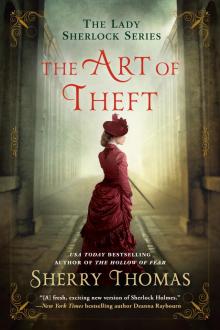 The Art of Theft
The Art of Theft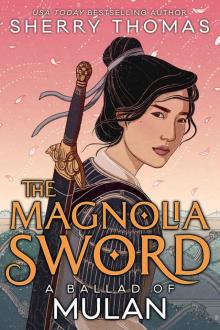 The Magnolia Sword: A Ballad of Mulan
The Magnolia Sword: A Ballad of Mulan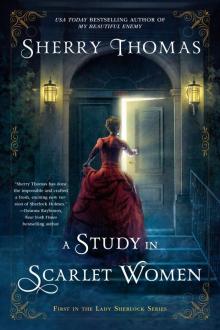 A Study In Scarlet Women
A Study In Scarlet Women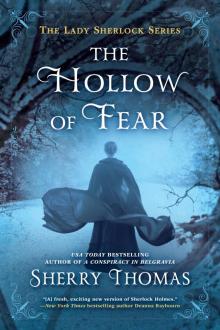 The Hollow of Fear
The Hollow of Fear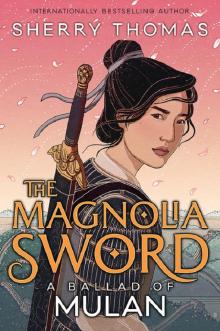 The Magnolia Sword
The Magnolia Sword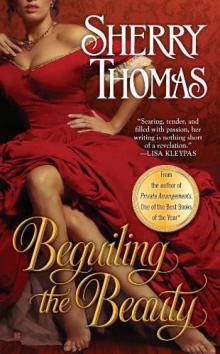 Beguiling the Beauty ft-1
Beguiling the Beauty ft-1 The Heart is a Universe
The Heart is a Universe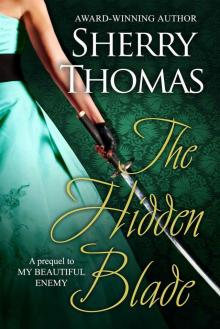 The Hidden Blade: A Prequel to My Beautiful Enemy (Heart of Blade)
The Hidden Blade: A Prequel to My Beautiful Enemy (Heart of Blade)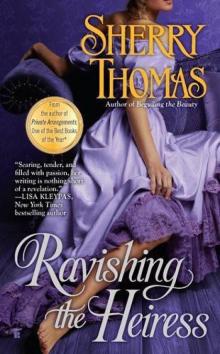 Ravishing the Heiress ft-2
Ravishing the Heiress ft-2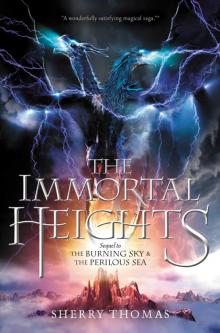 The Immortal Heights
The Immortal Heights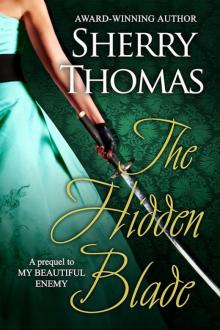 The Hidden Blade
The Hidden Blade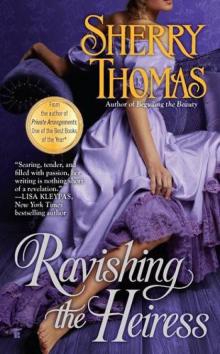 Ravishing the Heiress
Ravishing the Heiress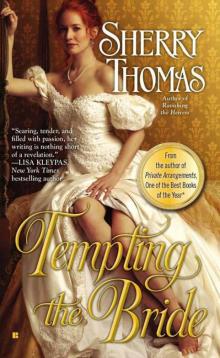 Tempting the Bride
Tempting the Bride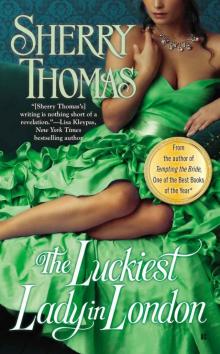 The Luckiest Lady in London
The Luckiest Lady in London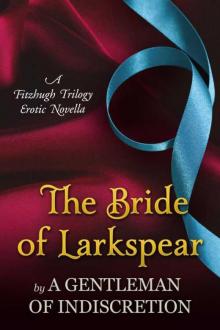 The Bride of Larkspear: A Fitzhugh Trilogy Erotic Novella
The Bride of Larkspear: A Fitzhugh Trilogy Erotic Novella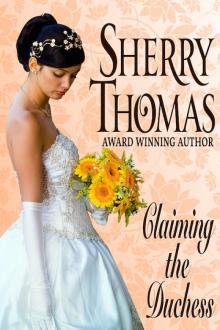 Claiming the Duchess
Claiming the Duchess The One in My Heart
The One in My Heart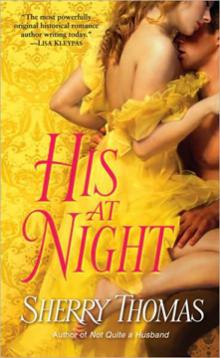 His At Night
His At Night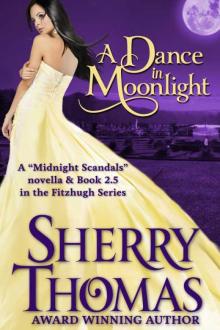 A Dance in Moonlight
A Dance in Moonlight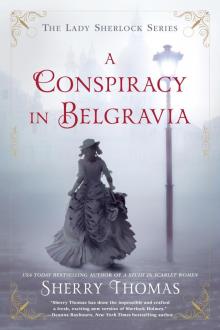 A Conspiracy in Belgravia
A Conspiracy in Belgravia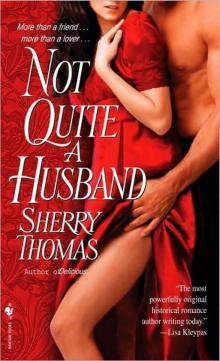 Not Quite a Husband
Not Quite a Husband